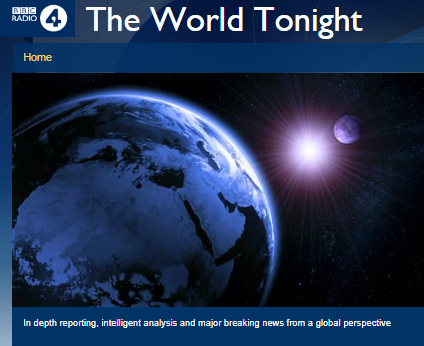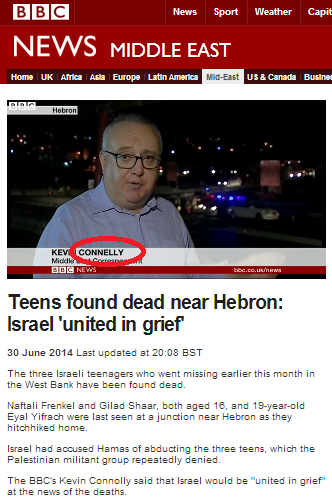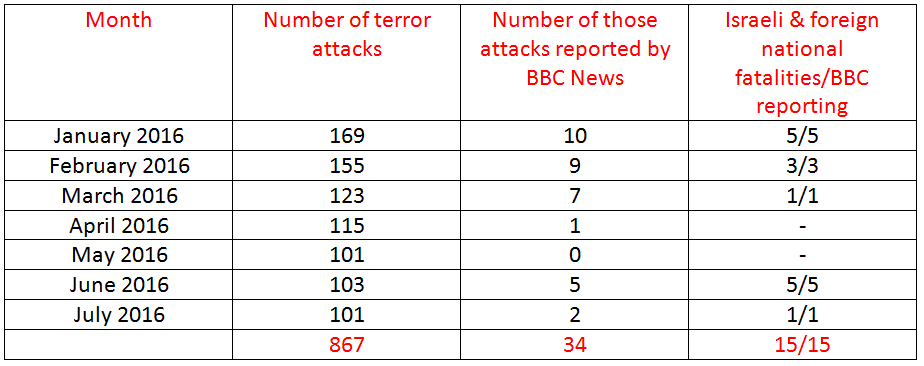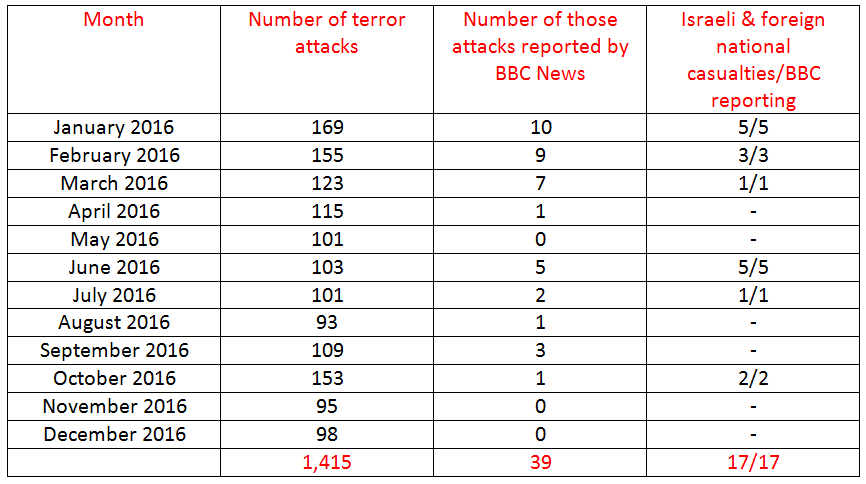As we saw previously when, on August 28th, the New Statesman published an interview with the former Chief Rabbi Lord Jonathan Sacks in which he addressed comments made by the current UK Labour party leader in 2013, listeners to BBC Radio 4 heard inaccurate framing of that story repeatedly promoted by the BBC political correspondent Tom Barton.
The same editorial policy was evident in the news bulletin heard by listeners to BBC Radio 4’s ‘The World Tonight’ on August 28th (from 02:30 here). [emphasis in bold added, emphasis in italics in the original]
Newsreader: “Labour has reacted angrily to allegations by the former Chief Rabbi Jonathan Sacks that Jeremy Corbyn is antisemitic. Lord Sacks also described comments about a group of British Zionists made by Mr Corbyn before he became Labour leader as the most offensive by a senior British politician since Enoch Powell in the 1960s. Here’s our political correspondent Tom Barton.”
Barton: “Lord Sacks was referring to a speech Jeremy Corbyn gave in 2013 in which he spoke about a group of Zionists who, he claimed, didn’t understand English irony. The former Chief Rabbi told the New Statesman that was the most offensive statement made by a senior British politician since Enoch Powell’s ‘rivers of blood’ speech in 1968. He said the comments implied Jews were not fully British and described Jeremy Corbyn as an antisemite. Labour said comparing its leader with the race-baiting Enoch Powell was absurd and offensive. The party added that Mr Corbyn had used the word Zionist in the accurate political sense to describe a particular group of pro-Israel activists and not as a synonym or code for Jewish people.”
As noted here previously, by the time Barton was presenting that report he had been provided with a transcript of edited parts of Corbyn’s speech which showed that he was not talking about “a particular group” of people but about British Zionist Jews. He had also been told by the man who recorded Corbyn’s 2013 speech that as far as he knew, he was the only ‘pro-Israel activist’ present. Nevertheless – and even as it was obvious that Rabbi Lord Sacks’ comments were based on the fact that he did not buy into the notion that Corbyn was referring to a “particular group” present at a particular event – Barton continued to amplify the team Corbyn framing which hinders audience understanding of those comments.
Later on in the same programme (from 22:00 here) listeners heard an item described in its synopsis as follows:
“We discuss the latest row over Jeremy Corbyn – the former Chief Rabbi has described some of the Labour leader’s remarks as the most offensive made by a senior British politician since Enoch Powell’s Rivers of Blood speech.”
Presenter Chris Mason began by playing a recording of part of Powell’s 1968 ‘rivers of blood’ speech followed by a recording from the 2013 speech by the person he described as “the then obscure Labour back bencher Jeremy Corbyn”. Listeners next heard a reading of some of Lord Sacks’ related comments including:
“It was divisive, hateful and like Powell’s speech it undermines the existence of an entire group of British citizens by depicting them as essentially alien.”
Declaring that “we’re going to explore both sides of the argument”, Mason went on to introduce his first contributor as “Jewish, a journalist and a member of the Labour Party”. He did not however inform listeners of the relevant fact that Michael Segalov is a Corbyn supporter and apparently a member of Momentum.
After Segalov had tried to persuade listeners that Corbyn’s 2013 comments were “a joke he tried to make” he absurdly went on to claim that:
Segalov: “They came – let’s be clear – at a time when Israel-Palestine wasn’t at the heart of political debate in this country.”
Segalov added:
Segalov [24:10]: “…I don’t think Jeremy would have used those words today but to compare them and to conflate them with, you know, the real abhorrent racism that’s expressed in the ‘rivers of blood’ speech is frankly [a] disservice to that racism that really existed then.”
Sidestepping that signposting of antisemitism as not ‘real’ racism, Mason asked:
Mason: “What about that other point in the line from Jeremy Corbyn? Yes, there was the argument about the use of the word Zionist but there was also that line about English irony – and ultimately belonging – casting in the eyes of some Jewish people as outsiders; as somehow not properly English or British.”
Listeners again heard Segalov try to present Corbyn’s remarks as a joke fallen flat – “it wasn’t funny” and “it was clumsy language” – before he went on to claim that “he wasn’t casting an aspersion on all Jewish people”.
Mason did not bother to clarify to listeners that Corbyn’s reference to “Zionists” in fact describes the majority of British Jews before Segalov was given a platform from which to promote the claim that there is a need to “draw distinct lines between Judaism and Jewishness”.
Segalov: “And it sometimes feels that people on both sides are responsible because we don’t really draw those lines. There are people in the Labour Party, on the Left, who fail to do those things. They conflate Judaism and Zionism. But frankly many of our Jewish leaders do the same thing too. Rabbi Sacks does that in his interview to some extent. Look at our current Chief Rabbi Ephraim Mirvis who wrote in the Telegraph a few years ago and saying those things are one and the same Judaism and Zionism. I mean we deserve better; Jewish people deserve better and Palestinian people do too.”
In the article cited (not for the first time) by Segalov, Ephraim Mirvis wrote:
“Zionism is a belief in the right to Jewish self-determination in a land that has been at the centre of the Jewish world for more than 3,000 years. One can no more separate it from Judaism than separate the City of London from Great Britain.
Open a Jewish daily prayer book used in any part of the world and Zionism will leap out at you. The innumerable references to the land of Israel are inescapable and demonstrative. Throughout our collective history we have yearned for a chance to determine our own future, to revive an ancient language and return to rejoice in our love for this tiny sliver of land. Zionism is a movement celebrated by people right across the political spectrum, all over the world, and requires no endorsement or otherwise of the particular policies of any Israeli Government at any time.”
Listeners heard Segalov go on to claim that in order to “deal with” the issue of antisemitism in the British Labour Party there “has to be a concerted effort by the Jewish community and by the Labour Party” before again promoting the notion that there needs to be a conversation held “in the Jewish community and the Labour Party too: one that says we need to tackle antisemitism whenever it raises its ugly head but also says Judaism is a religion, Zionism and Israel are in politics” and going on to claim that Rabbi Sacks “conflated those two things”. Segalov proceeded to refer to another part of Lord Sacks’ New Statesman interview which has nothing to do with the Labour antisemitism story, asserting “that level of ignorance does no service to debate”.
Radio 4 listeners next heard Mason read out a Labour Party statement in which it was once again claimed that “Jeremy Corbyn described a particular group of pro-Israel activists as Zionists in the accurate political sense – not as a synonym or code for Jewish people”.
The second contributor to this item was Jonathan Goldstein of the Jewish Leadership Council who was first asked by Mason:
Mason: “Was Lord Sacks exaggerating?”
Two of Mason’s three subsequent questions presented clear signposting to listeners.
Mason: “Yeah but being precise about this intervention tonight and that comparison with the ‘rivers of blood’ speech.”
Mason: “In specific terms though, is the comparison with the ‘rivers of blood’ speech fair? Not least because Enoch Powell was a shadow minister at the time; he knew his message would be heard by a national audience and he knew it has a capacity to offend. Mr Corbyn didn’t.”
Unless the BBC’s domestic audiences are given both an accurate portrayal of the content and circumstances of Corbyn’s 2013 speech and a critical view of his supporters’ statements after it came to light, they will clearly not be able to “engage fully” with that issue or understand the ensuing criticism of the Labour leader.
However, as Radio 4’s reporting of this latest story shows, the BBC’s funding public continues to be denied that full range of information.
Related Articles:
BBC’s political correspondent continues to push Labour framing
BBC R4 news reporting of Corbyn ‘irony’ story to domestic audiences
Guardian op-ed challenges the ‘rigid’ Yom Ha’atzmaut ‘orthodoxy’ that Israel should exist




